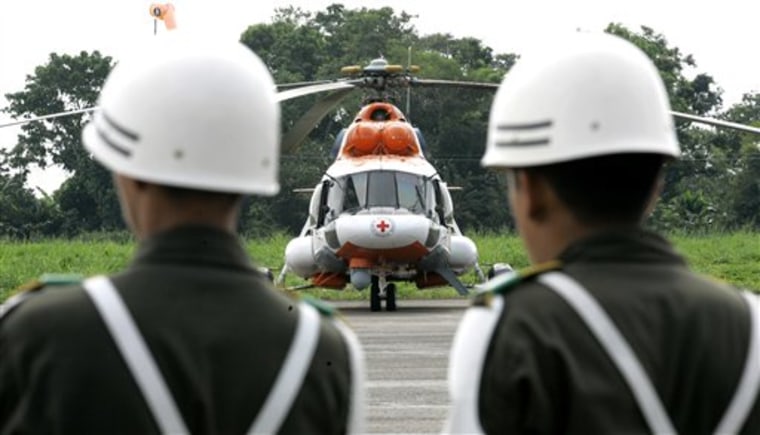A Venezuelan-led mission to rescue three hostages, including a young boy, from leftist rebels in Colombia's jungles fell apart Monday, with the guerrillas accusing Colombia's military of sabotaging the promised handoff.
Colombian President Alvaro Uribe dismissed the claim as a lie by the Revolutionary Armed Forces of Colombia, or FARC, instead suggesting the guerrillas could be backing out of the deal brokered by President Hugo Chavez because they don't have the boy hostage.
"The FARC terrorist group doesn't have any excuse. They've fooled Colombia and now they want to fool the international community," Uribe said from the central Colombian city where Venezuela helicopters have been waiting since Friday for word from the guerrillas on where the hostages could be picked up.
He made the shocking suggestion that the guerrillas "don't dare to keep their promises because they don't have the boy, Emmanuel" — who the FARC announced two weeks ago they'd free along with his mother, Clara Rojas, and former congresswoman Consuelo Gonzalez.
Uribe said his government had given Venezuela and the international Red Cross coordinating the mission every guarantee that its military would not obstruct the handover, even promising to create a cease-fire corridor to allow the rebels to escort their hostages through the jungles to the pickup point.
Observers leave town
Former Argentine President Nestor Kirchner and observers from France, Switzerland and four other Latin American nations abandoned Villavicencio on Monday.
"Shame on Colombia, shame on Uribe," Oliver Stone, the American filmmaker, said shortly before boarding one of three Venezuelan jets carrying the observers back to Caracas. Stone, who was invited by Chavez to document the handover, added "the FARC have no motive not to release these hostages."
Uribe said a 3-year old child named Juan David Gomez, matching the description of Emmanuel provided by escaped hostages and suffering from malnutrition, malaria and jungle-born leishmaniasis, may have been living for the past two and a half years with at a foster home in Bogota.
The child was turned over in the eastern city of San Jose del Guaviare, a FARC stronghold, in 2005 by a man who said he was the boy's great uncle and who authorities now believe was his father. The boy's mother was reported as disappeared, according to the child welfare agency case file read to journalists by peace commissioner Luis Carlos Restrepo.
The Colombian leader said only DNA tests were required to prove or disprove "this hypothesis" — which he said could be done as soon as the boy's grandmother returns from Caracas, where she was awaiting the handover of her daughter and grandson.
Ivan Rojas, brother of Clara Rojas, said his family was having a meeting to digest Uribe's revelation.
Chavez accuses Colombia's president
Chavez, even while holding out the possibility the boy may not be in the FARC's hands, accused Uribe of traveling to Villavicencio "to dynamite the hostage rescue mission with a smoke screen."
"Hopefully the hypothesis of Uribe is correct. The FARC would look very bad to the entire world in light of such a lie," he added.
Speaking earlier on Venezuelan state television, Chavez said the rebels wrote in a letter that "the military operational attempts in the zone impede us for now from turning over" the three hostages.
In the letter, the FARC said that "insisting on (a handover) in these conditions would be putting at risk" the lives of hostages and guerrillas sent to turn them over.
Uribe last month abruptly ended Chavez's efforts to broker a wider swap of 44 high-profile hostages — including three American defense contractors and former Colombian presidential candidate Ingrid Betancourt — for hundreds of jailed rebels.
The U.S.-allied Uribe has used some $600 million in annual military and intelligence aid from Washington to push the half-century-old insurgency deeper into the jungle.
